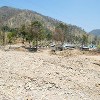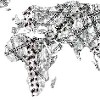Projects
Economic migration, capital flows, and welfare
This research project funded through the Systems Analysis Forum (SAF) aims to better understand the interaction between labour flows and capital flows in an economy. This work will help to improve the assessment of welfare dynamics and evaluate policies that can lead to higher levels of economic welfare. More
Citizen Science for Landslide Risk Reduction and Disaster Resilience Building in Mountain Regions (Landslide EVO)
Landslide EVO brings together experts in environmental hazards, engineering social sciences resilience, citizen science, and computational modelling to improve disaster resilience in Western Nepal. More
The Demography of Sustainable Human Wellbeing
This project aims to develop new indicators for long-term human wellbeing that include feedbacks from environmental and other changes. It is funded through an ERC Advanced Grant awarded to Wolfgang Lutz. More
EconTrans
EconTrans takes an innovative integrated approach to address challenges that are deeply interlinked: reducing greenhouse gas (GHG) emissions, achieving the Sustainable Development Goals (SDGs), and coping with fundamental transformations triggered by disruptive technologies. The spatial focus of EconTrans is on Austria, while its emissions perspective and policy embedding is globally consistent. More
TransLoss
Loss and Damage (L&D) has gained traction since it became apparent that climate change would lead to impacts that cannot, or will not, be tackled by mitigation or adaptation. While current research mainly focuses on L&D in the Global South, our objective is to provide policy-relevant scientific insights from the perspective of Austria, a Global North country. More
Future Migration Scenarios for Europe
The project will focus on understanding the patterns, motivations and modalities of migration at multiple geographical scales, from international through regional to the local, and on imagining possible futures. More
Quantifying Migration Scenarios for Better Policy
The overarching aim of this project is to produce comprehensive, multi-perspective and robust quantitative migration scenarios to support various areas of European migration policy, based on the cutting-edge developments in conceptualising, explaining, estimating and forecasting migration. More
Agent-based models to inform economic policies on migration (ABM2Policy)
Unanticipated migration inflows can have positive and negative economic and social consequences depending on policies implemented by the recipient country to cope with the manifold challenges. Model-based scientific assessments of in-migration on a country's national economy are hence needed, as is meaningful stakeholder deliberation of alternative policies to support the integration of refugees in ways that contribute to resilient and sustainable societies. More
Resource nexus for transformation to circular, resilient, and liveable cities in the context of climate change (RECREATE)
Urban metabolism is a model to study the flow of energy and resources as they enter cities, how they are used and consumed, and how they exist cities as wastes. By studying urban metabolism, we can get a better understanding of how resources are used and ways to reduce negative environmental impact. As the fraction of people living in cities continue to expand around the world, urban metabolism analysis can help decision makers develop cities to become resource efficient, climate friendly, resilient and equitable. More
Demographic perspectives of the impact of COVID-19 pandemic
Applying demographic concepts and methodological tools, researchers at IIASA's World Population Program (POP) in collaboration with Wittgenstein Centre researchers, international collaborators and stakeholders have been working on different projects looking at the vulnerability dimension and differential impact of the COVID-19 pandemic. More
makingAchange
Educational and research institutions can provide necessary stimuli for societal changes. To provide students and graduates with the necessary competences to overcome the Global Grand Challenges, a paradigm shift is needed to enable new methods and ways of thinking as well as engagement and attitudes towards sustainable development. More
Climate change induced water stress – participatory modelling to identify risks and opportunities in Austrian regions (WaterStressAT)
In WaterStressAT we assess water availability and demand in Austrian regions considering alternative socio-economic and climate futures. This is to understand the risk of water stress and associated management opportunities. We are in the process of establishing a stakeholder co-design process spanning the entire project duration involving joint problem-framing, participatory modelling, and co-producing bottom-up water stress scenarios as well as risk management options. More
PUBLICATIONS

















